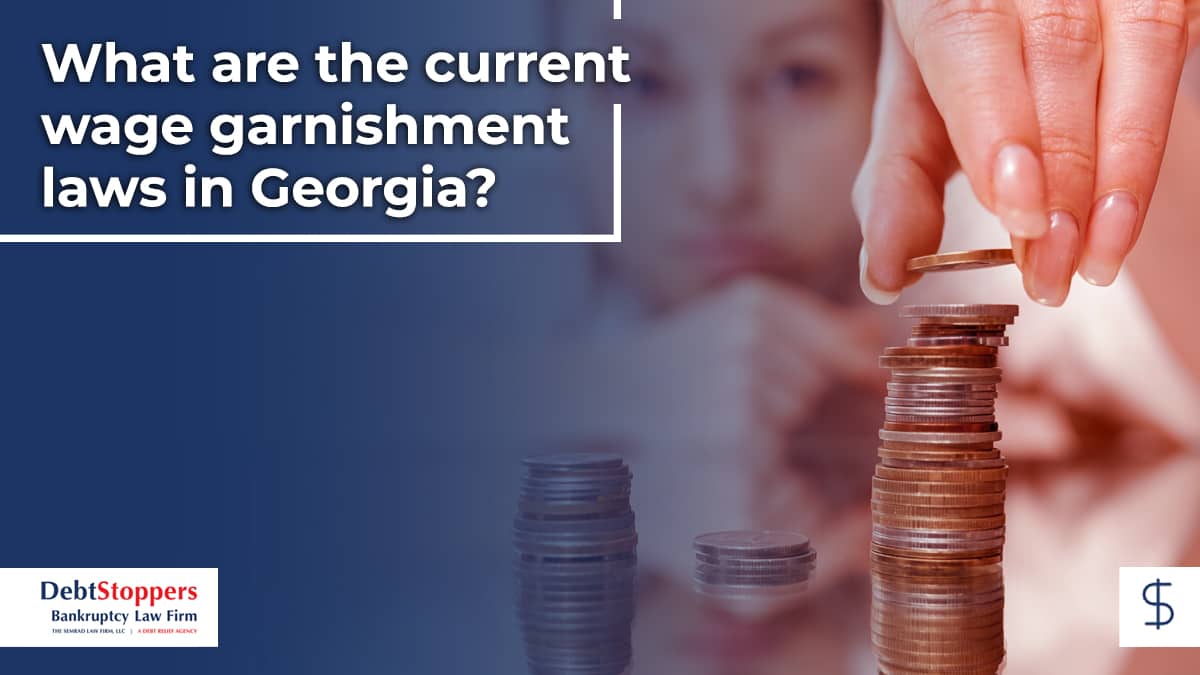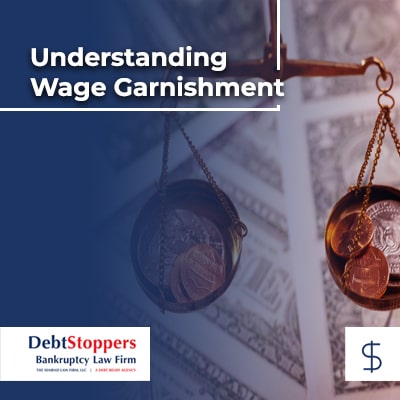What are the current wage garnishment laws in Georgia?
Updated on 17 September 2025

In Georgia, wage garnishment laws are governed by both state and federal regulations, which outline the procedures and limitations for garnishing wages. Wage garnishment is a legal process that allows creditors to collect debts by deducting money directly from an individual's paycheck.
Introduction to Wage Garnishment Laws in Georgia
Wage garnishment in Georgia can be used to collect various types of debts, including consumer debts (e.g., credit card debt, medical bills), court judgments, and child support or alimony payments. Georgia follows federal guidelines when it comes to the maximum amount that can be garnished from an individual's wages.
Before initiating wage garnishment, creditors must provide debtors with a written notice of the garnishment action. This notice typically includes details such as the amount being garnished, the duration of the garnishment, and any applicable exemptions.
Georgia law prohibits employers from terminating, demoting, or otherwise discriminating against employees due to wage garnishment. Employers must comply with garnishment orders and withhold the appropriate amount from the employee's wages.

Understanding Wage Garnishment
The process of obtaining a wage garnishment order in Georgia typically involves filing a lawsuit and obtaining a judgment against the debtor. Once a judgment is obtained, the creditor can request a garnishment order from the court, which instructs the debtor's employer to withhold a portion of the debtor's wages. Debtors have the right to challenge wage garnishment if they believe it is improper or exceeds allowable limits. This may involve filing a claim of exemption with the court or challenging the garnishment order through legal proceedings.
It's essential for individuals facing wage garnishment in Georgia to understand their rights and options under state and federal law. Seeking legal advice from a qualified attorney can help debtors navigate the wage garnishment process, assert their rights, and explore potential defenses or alternatives for managing debt.
Importance of wage garnishment in Georgia
In Georgia, it is important to understand how wage garnishment works and why it matters. Wage garnishment can have a significant impact on your financial stability and make it difficult to keep up with basic living expenses.
Wage garnishment allows creditors to collect a portion of your paycheck to repay a debt. In Georgia, creditors must obtain a court judgment before garnishing your wages, which means you will usually have advance notice before the garnishment begins. However, once the court order is in place, your employer is required to withhold a percentage of your earnings and send it directly to the creditor.
Under Georgia law, creditors can garnish up to 25% of your disposable income, which is the amount left after legally required deductions. For example, if you bring home $3,000 per month after taxes, up to $750 could be taken from your paycheck. Over time, this can make it nearly impossible to pay for essentials like rent, utilities, and groceries.
There are also rules in Georgia that apply to certain types of debts. For example, unpaid child support, student loans, or tax obligations may be subject to garnishment without a court judgment. That’s why it is important to respond promptly to legal notices and understand your options before wage garnishment begins.
If you are facing wage garnishment, bankruptcy may be a good option. Filing for bankruptcy can stop wage garnishment immediately through a legal provision called an automatic stay.
If you're worried about wage garnishment or already experiencing one, take action now. Our team of experienced attorneys offers free consultations to help you understand your rights and explore legal solutions. Whether you need help negotiating with creditors or filing for bankruptcy, we’re here to protect what you’ve earned and make life affordable.
How does wage garnishment in Georgia compare to other states?
In general, Georgia’s wage garnishment laws are very similar to most states. Like most states, Georgia utilizes the federal standard of 25% of disposal earnings to be garnished. However, Georgia does have some specific rules that offer some additional protection including the 30 times minimum wage exemption. The 30x minimum wage exemption means that your wages cannot be garnished if your disposable income is less than 30 times the federal minimum wage. Currently, that means that if your disposable earnings are less than $217.50 per week ($7.25 x 30 = $217.5), your wages will not be garnished in Georgia.
It’s also important to know that Georgia requires a court order for wage garnishment for consumer debt. However, other types of debt such as tax debt and child support do not require a court order.
Overview of Wage Garnishment Laws in the United States
Wage garnishment laws govern the process by which creditors can collect debts by deducting money directly from an individual's paycheck. These laws are primarily federal regulations, although specific rules and procedures may vary by state.
Before creditors can initiate wage garnishment, they must obtain a court judgment or order confirming the validity of the debt and authorizing wage garnishment. Creditors must also provide the debtor with notice of the garnishment action and an opportunity to challenge the garnishment in court.
It's essential for anyone facing wage garnishment to understand their rights and options under federal and state law. Seeking legal advice from a qualified attorney can help you navigate the wage garnishment process, assert your rights, and explore potential defenses or alternatives for managing debt.
Federal Wage Garnishment Laws
Federal law sets limits on the amount that creditors can garnish from an individual's wages. In most cases, creditors can garnish up to 25% of the debtor's disposable earnings (earnings after taxes and other mandatory deductions) or the amount by which the debtor's weekly disposable earnings exceed 30 times the federal minimum wage, whichever is less.
Federal law provides certain exemptions from wage garnishment to protect specific types of income and property. Exemptions may include Social Security benefits, Supplemental Security Income (SSI), unemployment benefits, workers' compensation benefits, certain types of retirement income, and veterans' benefits. States may also have additional exemptions that vary by jurisdiction.
Employers are required to comply with wage garnishment orders issued by the court. Once an employer receives a garnishment order, they are responsible for withholding the specified amount from the employee's paycheck and remitting it to the creditor as directed by the court.
How State Laws Can Vary
Wage garnishment laws can vary significantly from state to state, as each state has its own statutes, regulations, and procedures governing the process of wage garnishment. These variations can impact aspects such as the types of debts subject to garnishment, the maximum amount that can be garnished, exemptions from garnishment, procedural requirements for creditors and employers, and penalties for noncompliance.
The Current Wage Garnishment Laws in Georgia
Georgia wage garnishment laws govern the maximum garnishment limits, types of debts subject to garnishment, the process of garnishing wages, and more. It’s important to understand the federal and state laws that apply to your situation.
Maximum Garnishment Limits
Under Georgia law, creditors are limited in the amount they can garnish from an individual's wages. In most cases, creditors can garnish up to 25% of the debtor's disposable earnings or the amount by which the debtor's weekly disposable earnings exceed 30 times the federal minimum wage, whichever is less.
Types of Debts Subject to Garnishment
Wage garnishment in Georgia can typically occur for various types of debts, including unpaid medical bills, credit card debt, personal loans, student loans, and unpaid taxes. However, Certain types of income and property are exempt from wage garnishment in Georgia. Exemptions may include Social Security benefits, Supplemental Security Income (SSI), unemployment benefits, workers' compensation benefits, and certain types of retirement income. Additionally, individuals with low income or who provide financial support to dependents may qualify for additional exemptions.
The Process of Wage Garnishment in Georgia
Before creditors can initiate wage garnishment in Georgia, they must obtain a court judgment against the debtor, confirming the validity of the debt and authorizing wage garnishment. Creditors must also provide the debtor with notice of the garnishment action and an opportunity to challenge the garnishment in court.

How Creditors Obtain Garnishment Orders
In Georgia, creditors obtain wage garnishment orders by obtaining a court order authorizing the garnishment of wages. Before seeking wage garnishment, creditors typically attempt to collect unpaid debts through other means, such as sending collection letters, making phone calls, or negotiating payment arrangements with the debtor. If these efforts are unsuccessful, the creditor may pursue legal action to obtain a judgment for the debt by filing a lawsuit.
After obtaining a judgment against the debtor, the creditor can then seek a wage garnishment order from the court. The creditor must file a request with the court, along with a copy of the judgment and supporting documentation, to obtain the garnishment order. If the court determines that the creditor is entitled to garnish the debtor's wages based on the judgment, it will issue a wage garnishment order authorizing the garnishment of wages.
Employer's Role in Wage Garnishment
Employers are required to comply with wage garnishment orders issued by the court. Once an employer receives a garnishment order, they are responsible for withholding the specified amount from the employee's paycheck and remitting it to the creditor as directed by the court.
Employee Notification and Response
In Georgia, both employers and employees have certain rights and responsibilities regarding wage garnishment. When an employer receives a wage garnishment order, they must notify the employee and take specific actions to comply with the court order. Likewise, employees have the right to receive notification about the garnishment and may have options for responding or challenging the garnishment.
Exceptions to Wage Garnishment in Georgia
In Georgia, some common exceptions to wage garnishment include child support and alimony, head of household, low income, government benefits (e.g., Social Security, Supplemental Security Income, and public assistance), retirement benefits, and certain types of income (e.g., unemployment, workers’s compensation, and disability benefits).
It's important to note that these exceptions may vary depending on the specific circumstances and type of debt involved. Additionally, some creditors may have different procedures or limitations for garnishing wages, so it's advisable to consult with a legal expert for personalized guidance.
Bankruptcy and Its Impact on Wage Garnishment
Bankruptcy can have a significant impact on wage garnishment, as it is a legal process that provides relief from overwhelming debt. The impact of bankruptcy on wage garnishment depends on the type of bankruptcy filed (Chapter 7 or Chapter 13) and the specific circumstances of the debtor.
In Chapter 7 bankruptcy, also known as liquidation bankruptcy, the debtor's non-exempt assets are sold to repay creditors, and remaining eligible debts are discharged. Wage garnishment may be stopped permanently for most types of debts once they are discharged through Chapter 7 bankruptcy.
In Chapter 13 bankruptcy, also known as reorganization bankruptcy, the debtor creates a repayment plan to pay off debts over a period of three to five years. Wage garnishment may be stopped or modified under the terms of the repayment plan, allowing the debtor to catch up on missed payments.
In some cases, debtors may choose to reaffirm certain debts, meaning they agree to continue paying them even after bankruptcy. If a debtor reaffirms a debt that was previously subject to wage garnishment, the garnishment may continue according to the terms of the reaffirmation agreement.
When a person files for bankruptcy, an automatic stay goes into effect. This automatic stay immediately stops most creditors, including those attempting to garnish wages, from collecting on debts. Wage garnishment proceedings must cease as soon as the automatic stay is in place.
Specific Cases
It's important to consult with a qualified bankruptcy attorney to understand how bankruptcy may impact your specific situation, including any wage garnishment issues, and to explore the best course of action based on your financial circumstances.
Rights and Protections for Employees
In Georgia, employees have certain rights and protections regarding wage garnishment, which are governed by both federal and state laws. Some key rights and protections for employees facing wage garnishment include:
-
Notice Requirement - Employers must provide employees with a written notice of the garnishment action, including details such as the amount being garnished, the duration of the garnishment, and any applicable exemptions.
-
Limits on Amount Garnished - Under federal law (the Consumer Credit Protection Act), wage garnishment cannot exceed 25% of disposable earnings or the amount by which disposable earnings exceed 30 times the federal minimum wage, whichever is less. Some types of debts, such as child support and taxes, may have different limits.
-
Protection from Retaliation - Employers are prohibited from retaliating against employees due to wage garnishment. This means employers cannot terminate, demote, or otherwise discriminate against employees because their wages are being garnished.
-
Opportunity to Contest Garnishment - Employees have the right to challenge the garnishment if they believe it is improper or exceeds the allowable limits. This typically involves filing a claim of exemption with the court overseeing the garnishment action.
-
Priority of Garnishments - If an employee is subject to multiple garnishments, federal law establishes a priority order for withholding, with certain types of debts taking precedence over others.
-
Recordkeeping Requirements - Employers are required to keep accurate records of wage garnishments and payments made to creditors on behalf of employees.
Employees facing wage garnishment should understand their rights and seek legal advice if they have questions or concerns about the garnishment process.
How can Debtstoppers help you navigate Georgia wage garnishment laws?
If your wages have already been garnished or you are worried they may be garnished in the future, you should talk to an attorney.
The experienced attorneys at DebtStoppers provide free consultations. They can help assess your situation and ensure you understand your options. If your wages are being garnished, bankruptcy may be the solution you need to make life affordable again.
As soon as you file bankruptcy, an automatic stay goes into effect, which immediately halts the garnishment. In fact, you may even be able to recover money that was garnished in the past 90 days.
Frequently Asked Questions about Georgia's Wage Garnishment Laws
Some frequently asked questions about wage garnishment laws in Georgia are addressed below:
How to Stop a Wage Garnishment
Stopping a wage garnishment can be challenging, but there are several steps you can take to potentially halt or reduce the garnishment. Some options you have include negotiating with the creditor, filing for bankruptcy, filing a claim of exemption, and challenging the garnishment in court. It is a good idea to consult with a qualified attorney who specializes in consumer protection laws and can review your situation, explain your rights and options, and help you determine the best course of action for stopping the wage garnishment.
It's important to act quickly if you're facing wage garnishment, as delays can limit your options for stopping or reducing the garnishment. Be proactive in seeking assistance and exploring your legal rights and options for addressing the debt.
What to Do if Excessive Wages are Garnished
If you believe that an excessive amount of your wages are being garnished, there are several steps you can take to address the situation.
First, carefully review the garnishment order to ensure that the correct amount is being withheld from your wages. Verify that the calculations are accurate and comply with federal and state laws regarding the maximum amount that can be garnished.
Next, consider seeking legal advice from an attorney who specializes in debt collection and consumer protection laws. An attorney can review the garnishment order and your financial situation to determine if any errors have occurred or if the garnishment exceeds allowable limits. If you believe that the garnishment is excessive or improper, you may be able to file a claim of exemption with the court overseeing the garnishment action.
It may also be possible to negotiate with the creditor or agency handling the garnishment. In some cases, they may be willing to negotiate a repayment plan or settle the debt for a reduced amount that is more manageable for you.
If you are unable to resolve the issue through negotiation or exemption, filing for bankruptcy may be an option to stop the wage garnishment. Bankruptcy triggers an automatic stay, which immediately stops most creditors from collecting on debts, including wage garnishment. Depending on your financial situation and the type of bankruptcy filed, you may be able to discharge or reorganize your debts.
It's important to act quickly if you believe that an excessive amount of your wages are being garnished, as delays may limit your options for addressing the situation. Be proactive in seeking assistance and exploring your legal rights and options for resolving the garnishment.
Impact of Changing Jobs on Wage Garnishment
Changing jobs can have implications for wage garnishment, but the specifics depend on various factors including the type of garnishment, the laws in your jurisdiction, and the terms of the garnishment order.
In most cases, wage garnishment orders remain in effect even if you change jobs. This means that the garnishment will continue as long as it is valid and enforceable, regardless of your employment status. You are generally required to notify the creditor or garnishment agency of any changes in employment, including changes in employer or income. Failure to do so could result in legal consequences, including potential penalties for non-compliance with the garnishment order.
When you change jobs, your new employer may be required to honor the existing garnishment order if they receive proper notification from the creditor or garnishment agency. This typically involves providing the new employer with a copy of the garnishment order and instructions for withholding wages. There may be a brief delay or interruption in the garnishment process when you change jobs, especially if there is a gap between your last paycheck from your previous job and your first paycheck from your new job. However, once the new employer receives the garnishment order, they will typically begin withholding wages as required.
If your new job pays a different salary or wage rate compared to your previous job, the amount subject to garnishment may change accordingly. However, the garnishment order itself remains valid unless modified by the court.
Overall, changing jobs does not automatically stop or alter wage garnishment, but it may impact the logistics of how the garnishment is implemented and the amount withheld from your wages. It's essential to stay informed about your rights and obligations regarding wage garnishment, especially when experiencing significant life changes like changing jobs.





